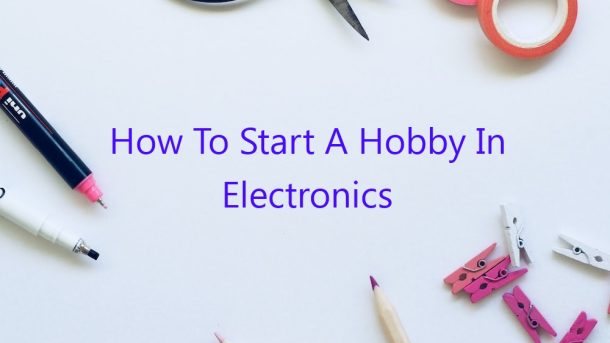When it comes to hobbies, electronics is one of the most popular options. After all, it’s a fascinating and rapidly-growing field that offers a lot of potential for exploration. But if you’re new to electronics, it can be difficult to know where to start.
In this article, we’ll discuss the basics of starting a hobby in electronics. We’ll cover everything from choosing the right equipment to learning the basics of electronics theory. So whether you’re a complete beginner or you’re just looking for a refresher, read on for everything you need to get started in electronics!
Choosing the Right Equipment
The first step in starting a hobby in electronics is choosing the right equipment. This will depend on your level of experience and the types of projects you want to work on.
If you’re a beginner, we recommend starting with a basic electronics kit. This will give you everything you need to get started, including a soldering iron, a multimeter, and a variety of components.
If you’re more experienced, you may want to invest in some more advanced equipment. This could include a digital oscilloscope, a logic analyzer, or a breadboard.
whichever equipment you choose, be sure to read the instructions carefully and practice using it before starting any projects.
Learning the Basics of Electronics Theory
Once you’ve got the right equipment, the next step is to learn the basics of electronics theory. This will give you a foundation on which to build your skills.
There are many different ways to learn electronics theory, but a good place to start is with our beginner’s guide to electronics. This guide covers everything from basic concepts like voltage and current to more complex topics like logic gates and microcontrollers.
Once you’ve mastered the basics, you can move on to more advanced concepts like digital signal processing and circuit simulation.
Starting Projects
Now that you know the basics of electronics theory, it’s time to start your first project!
There are endless possibilities when it comes to electronics projects, but a good place to start is with something simple. A good project for beginners might be to build a basic LED circuit, or to create a simple alarm system using a microcontroller.
Once you’ve completed a few simple projects, you can move on to more complex ones. For example, you could build an electronic drum kit, a digital clock, or even a computer!
The possibilities are endless, so be creative and have fun!
Contents [hide]
How do I get an electronic hobby?
How do I get an electronic hobby? This is a question many people have, and there is no one-size-fits-all answer. The best way to get into electronics is to find a project that interests you and dive in. There are plenty of resources available to help you, from online forums and communities to books and articles.
One popular way to get started in electronics is to build your own Arduino projects. Arduino is a microcontroller platform that is popular for hobbyists because it is easy to use and has a large community of users. There are plenty of tutorials available online that can walk you through everything from setting up your Arduino to creating your first project.
Another great way to get into electronics is to tinker with circuits. This can be a great way to learn the basics of electronics and to come up with your own ideas for projects. You can find schematics for all sorts of circuits online, and there are plenty of online communities where you can share your projects and get feedback from other hobbyists.
If you’re looking for a more structured learning experience, there are plenty of courses available online that can teach you the basics of electronics. These courses can be a great way to get started, but it’s important to remember that they are just a starting point. Once you have a basic understanding of electronics, it’s important to start tinkering and experimenting to learn more.
There is no one way to get into electronics, so find what interests you and dive in. There is a wealth of information available online and in books, and there are plenty of people happy to share their knowledge and help you get started in this fun and rewarding hobby.
Can you learn electronics as a hobby?
Yes, you can learn electronics as a hobby. In fact, it can be a lot of fun and very rewarding.
There are a number of ways to learn electronics. You can take classes at a local community college or university, or you can take online courses. There are also a number of books and online resources that can help you learn.
One of the best ways to learn is to practice. You can build simple circuits and then try to understand how they work. As you gain experience, you can try more complicated circuits.
Electronics can be a challenging hobby, but it’s also a lot of fun. If you’re interested in learning more, there are a number of resources available to help you get started.
Where do I start learning electronics?
There are a lot of different ways to learn electronics. You can find a lot of information on the internet, in books, or in classes. It can be a little overwhelming to know where to start.
One way to start learning electronics is to build simple circuits. You can find a lot of information online about how to build simple circuits. There are also a lot of books and classes that can teach you how to build circuits.
Another way to learn electronics is to study electronics theory. Theory can be a little difficult to learn, but it can give you a better understanding of how electronics work. There are a lot of books and classes that can teach you electronics theory.
Finally, you can also learn electronics by working on projects. There are a lot of different projects you can work on, from simple projects to more complex projects. There are also a lot of different ways to learn about projects. You can find information online, in books, or in classes.
What electronics should I learn first?
There are so many different types of electronics that it can be difficult to know where to start. Here is a guide to some of the most important electronics that you should learn first.
First, you should learn about basic electronics. This includes learning about electricity, basic circuitry, and how to use a soldering iron. You should also learn about basic components, such as resistors, capacitors, and transistors.
Next, you should learn about digital electronics. This includes learning about binary numbers, logic gates, and microcontrollers. You should also learn how to program in a language such as C or Python.
Finally, you should learn about analog electronics. This includes learning about amplifiers, oscillators, and filters. You should also learn how to use a multimeter and a spectrum analyzer.
What are the basics of electronics?
There are a few basics that everyone should know when it comes to electronics. This guide will teach you about voltage, current, resistance, and Ohm’s law, which will help you better understand how electronic devices work.
Voltage is the amount of potential energy that is in a circuit. Current is the flow of electrons through a circuit, and resistance is the amount of opposition that a circuit offers to current flow. Ohm’s law states that the current in a circuit is directly proportional to the voltage and inversely proportional to the resistance.
Knowing these basics will help you troubleshoot problems with electronic devices, as well as understand how they work.
Is Arduino a good hobby?
Arduino is a microcontroller board and software that can be used to create interactive objects or environments.
Some people argue that Arduino is not a good hobby because it is difficult to learn and use. Others argue that Arduino is a great hobby because it is very versatile and can be used to create a wide variety of projects.
Ultimately, the decision of whether Arduino is a good hobby for you depends on your own individual interests and abilities. If you are interested in learning how to use Arduino and are willing to put in the time and effort to learn, then Arduino can be a great hobby for you. If you are not interested in learning how to use Arduino, or if you find it difficult to learn, then Arduino may not be the best hobby for you.
How do you start a circuit?
How do you start a circuit? This is a question that is asked by many people, and the answer is not always straightforward. In order to start a circuit, you need to have a power supply, and you need to have something that will use that power supply to create energy. The most common way to start a circuit is by plugging something into an outlet. When you plug something into an outlet, it completes a circuit that allows electricity to flow.




